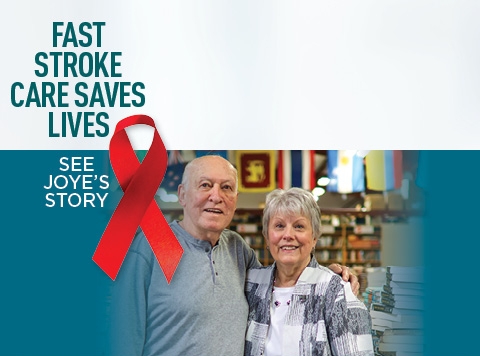McLeod Health Stroke Survivors Raise Awareness

May is National Stroke Month, a time to raise awareness of the devastating effects of stroke. In recognition of Stroke Month, patient testimonials were created of McLeod Health Stroke Survivors.
“I did not pay attention to the signs. The outcome of my stroke could have been so much worse. Thanks to Dr. Cory Smith and Dr. William Jackson, I received the expediated stroke care I needed.” — Joye Allen, MRMC Patient
Click here to read how recovery from stroke meant Joye could return to her volunteer work. mcleodhealth.org/Joye
McLeod Health is the region’s leader in advanced stroke care. Our specially trained Stroke and Neurosciences team provides expert care utilizing the latest procedures designed to save lives and minimize the effects of stroke.
While it is true that 80 percent of strokes can be prevented by making healthy lifestyle changes such as eating a healthy diet and keeping blood pressure under control, it is still important that everyone learn to recognize the symptoms of a stroke.
When an artery that supplies blood to the brain is blocked through a narrowing or blood clot, then an Ischemic stroke occurs.
Common stroke symptoms patients experience include:
- Vision problems, such as blindness in one eye or double vision
- Weakness in limbs, may be on one or both sides
- Dizziness and vertigo
- Confusion
- Loss of coordination
- Drooping of face on one side
If you or a loved one experience any of these symptoms it should prompt you to realize that you may be having a stroke. Once symptoms start it is crucial to get treatment as quickly as possible to make it less likely that any damage becomes permanent. Call 911 and get to the nearest emergency department.
Every minute counts for stroke patients and B.E. F.A.S.T. can lead patients to the stroke treatments they desperately need. The most effective stroke treatments are only available if the stroke is recognized and diagnosed within the first three hours of the onset of symptoms.
If you think someone may be having a stroke, B.E. F.A.S.T. and do this simple test:
B – BALANCE: Does the person have a loss of balance or coordination?
E – EYES: Does the person have trouble seeing out of one or both eyes?
F – FACE: Ask the person to smile. Does one side of the face droop?
A – ARMS: Ask the person to raise both arms. Does one arm drift downward?
S – SPEECH: Ask the person to repeat a simple phrase. Is their speech slurred or strange?
T – TIME: If you observe any of these signs, call 9-1-1 immediately.
-
McLEOD REGIONAL MEDICAL CENTER FLORENCE
843-777-2000 -
McLEOD DARLINGTON
843-777-1100 -
McLEOD DILLON
843-774-4111 -
McLEOD LORIS
843-716-7000 -
McLEOD SEACOAST
843-390-8100 -
McLEOD CHERAW
843-537-7881 -
McLEOD CLARENDON
803-433-3000



-
McLEOD REGIONAL MEDICAL CENTER FLORENCE
843-777-2000 -
McLEOD DARLINGTON
843-777-1100 -
McLEOD DILLON
843-774-4111 -
McLEOD LORIS
843-716-7000 -
McLEOD SEACOAST
843-390-8100 -
McLEOD CHERAW
843-537-7881 -
McLEOD CLARENDON
803-433-3000
 Find a Doctor
Find a Doctor  Locations
Locations  Services
Services